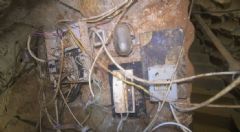Human Rights Voices
While the UN devotes its human rights operations to the demonization of the democratic state of Israel above all others and condemns the United States more often than the vast majority of non-democracies around the world, the voices of real victims around the world must be heard.
Palestinian Authority/Gaza, May 30, 2019
IDF reveals ‘longest, most significant’ Hezbollah tunnel on northern border of Israel
Original source
The Israel Defense Forces on Wednesday revealed a cross-border Hezbollah attack tunnel that was discovered running into Israeli territory from Lebanon during this past winter's Operation Northern Shield, saying it was "the longest and most significant" subterranean passage found in the effort.
The military released the additional details about this tunnel - one of six that the it said it found during the operation - ahead of its planned destruction.
The army said the tunnel was dug to a depth of 80 meters (260 feet), was a kilometer (3280 feet) long and penetrated 77 meters (250 feet) into Israeli territory. It began close to the Lebanese village of Ramiya, the IDF said, with an exit close to the Israeli villages of Shtula and Zar'it.
That was a slight adjustment from the military's initial assessments of the tunnel. When it was discovered in January, the IDF said it was dug at a depth of 55 meters (180 feet) and was 800 meters (2,600 feet) long.
The IDF said the tunnel was equipped with advanced infrastructure for electricity, ventilation and communications systems, and that the passage would have taken years to complete.
The passage will be sealed off in the coming days, rendering it unusable by Hezbollah. It has been under constant surveillance and was boobytrapped following its discovery on January 13. A small portion of the tunnel inside Israeli territory will remain open to allow people to visit the site and look inside, an army official said.
"We are neutralizing the flagship tunnel of the Hezbollah terrorist group. This is an attack tunnel," said Col. Roi Levi, commander of the Baram Regional Brigade, where the passage was found.
The IDF believes that this tunnel - and the five others found this winter - was built with the specific purpose of allowing thousands of Hezbollah terrorists to stage an infiltration attack on military and civilian targets in northern Israel as a surprise opening maneuver in a future war.
Approximately eight years ago, Hezbollah created a special forces unit - known as the Radwan Unit - specifically tasked with crossing into Israel and causing as much mayhem and destruction as possible both for the sake of the destruction itself and for the "symbolism" of having troops carry out attacks inside Israel.
"The IDF has unconcealed and covert [monitoring] equipment. We know the enemy, we are tracking it and we are studying it," Levi said.
Israel launched Operation Northern Shield on December 4 to find and destroy Hezbollah cross-border attack tunnels, and on January 13, the military announced it had found all of the passages and was working to demolish them.
"In addition, the IDF is monitoring and is in possession of a number of sites where Hezbollah is digging underground infrastructure that has yet to cross into Israeli territory," the army said at the time.
The IDF emphasized that the tunnel revealed on Wednesday was discovered as a result of an advanced technological operation by the IDF rather than residents' complaints of underground digging noises in the area.
As far back as 2014, residents of northern towns raised the alarm regarding the possibility of Hezbollah tunneling below the border to carry out attacks, after an extensive series of underground passages dug by the Hamas terror group were discovered under the Gaza border in the south.
According to the IDF, Hezbollah had planned to use the tunnels to kidnap or kill civilians or soldiers, and to seize a slice of Israeli territory in the event of any hostilities.
On Monday, Lebanese media reported Israeli aircraft had struck and destroyed a spying device in Lebanese territory. Earlier in the day the Israeli military clashed with some 15 Lebanese nationals along the northern border, firing tear gas and stun grenades at them, after two men scaled the border fence and attempted to damage it, the army said.
Israel has fought two wars in Lebanon, one in 1982 against Palestinian terrorist groups, and another in 2006 against Hezbollah, as well as a number of smaller operations.
Though seen as volatile, the border has not seen significant fighting since the end of the 2006 war.
Last month, the commander of the IDF's Ground Forces said Hezbollah was still planning to carry out a surprise invasion of northern Israel despite the recent anti-tunnel operation.
Maj. Gen. Yoel Strick, who was tapped to lead the Ground Forces in February amid criticism that Israeli troops were not prepared for war, told the Ynet news site that the IDF "of course won't allow that to happen."
Strick also voiced support for declaring war on Lebanon. "In the next war, it would be a mistake for us to distinguish between the State of Lebanon and Hezbollah, since Hezbollah is a political actor and part of the government," he said.
In such a conflict, "if it were up to me, I would recommend declaring war on Lebanon and Hezbollah," he said. "I have no doubt what the outcome will be... It will be a decisive victory."

